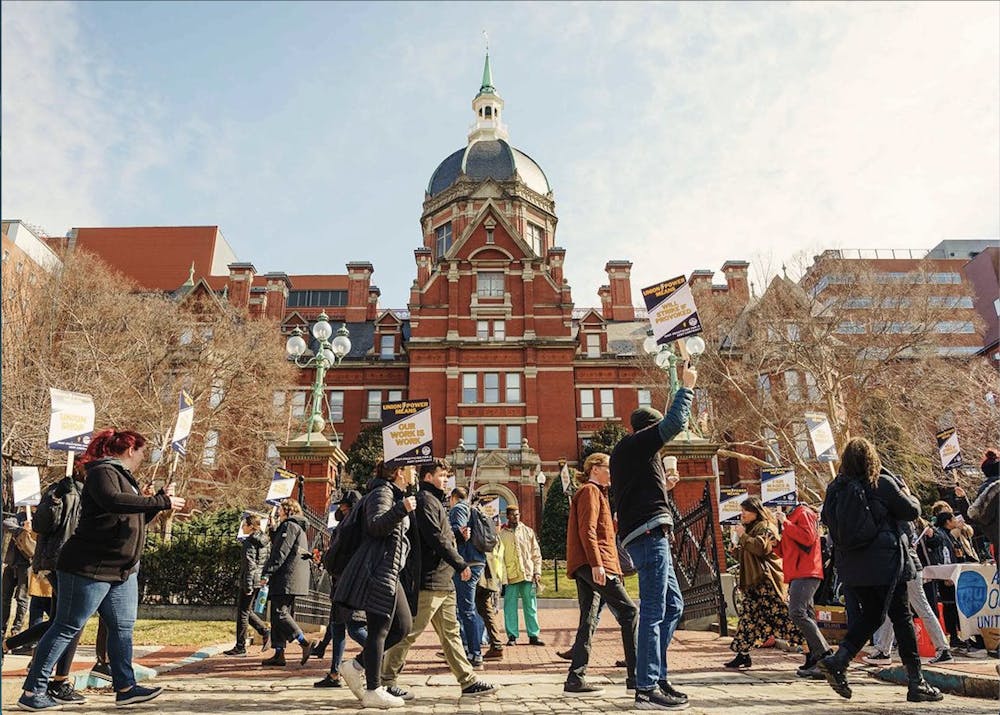The University’s graduate student union Teachers and Researchers United (TRU-UE) hosted a picket protest in front of Homewood Campus on Tuesday, Feb. 20. Members protested for a better contract with the University, with provisions including better compensation and the establishment of a closed union shop.
TRU-UE is affiliated with United Electrical, Radio and Machine Workers of America (UE), a nationwide trade union with over 35,000 members. Union members picketed with signs from both UE and TRU during their protest.
In their press release, TRU-UE highlighted the importance of graduate student labor and threatened to prepare for further escalations if the bargaining process did not progress. Several union members were quoted in their demands for future negotiations, including Emily Hoppe, a Ph.D. worker in the School of Nursing.
“We envision a different, better, inclusive, thriving vision of graduate school where we don’t have to suffer. Where we don’t have to choose between completing our dissertation and working three other jobs,” Hoppe wrote in the press release. “We are here to demand union power for a better life for all of us, and I am so excited to see it happen.”
Organizers of the event led practice pickets around the front of campus, with union members holding signs and chanting for fair compensation. The event organizers gave speeches and read complaints from fellow union members regarding the University’s administration.
One of the lead organizers, Janvi Madhani, explained the purpose of the picket and their disagreements with University administration in an interview with The News-Letter.
“Our members of TRU-UE, which represents over 3,400 graduate workers at Hopkins, are demonstrating for a fair contract,” she said. “We have three demands for this picket. We will not settle for a contract that does not meet the demands of a union shop, the recognition of our work as work and fair compensation in the form of fair wages and benefits.”
Other union members commented on the importance of these three provisions, especially the creation of a union shop. This would enforce union membership for all graduate students at Hopkins within an agreed upon time period.
Madhani, a fourth-year graduate student in Physics and Astronomy, further commented how the union has been in negotiations with the University for almost nine months. No deal has been agreed upon, as she claimed the University has been stalling on the Union’s three core previsions.
Madhani also spoke about the importance of unions for graduate students, commenting on unsafe working conditions and other issues.
“The whole reason we unionized is because existing University structures fail to protect graduate workers. Without a union, we have no way of having a fair say in our working conditions, ranging from unsafe lab environments and abusive advisors to discrimination in the workplace,” she said. “Almost 86% of our membership is rent burdened, meaning we're not able to make a fair wage. When we bring these up through existing University procedures, we are ignored. We had to collectively organize together to meet these demands as a union.”
In an interview with The News-Letter, union member Andrew Eneim voiced his displeasure with the University administration and failure of previous negotiations.
“After bargaining for nine months and over 40 negotiation sessions, we still don't have [a] contract and we're not getting the progress that we should from a world class institution like this,” he said. “We should be able to be treated as world class employees.”
TRU-UE picketed at the Hopkins East Baltimore campus earlier in the day. They were joined by dozens of union members, as well as supporters from the local community and other unions affiliated with Hopkins.
Justin Otter, an event organizer, explained the union’s support from other Baltimore organizations in an interview with The News-Letter.
“We've had hundreds of [graduate] workers here at Hopkins show up, in addition to some folks from other unions that are represented on campus, like Unite Here, which represents food service workers who work in the dining halls here at Hopkins,” he said. “We're trying to bring together not only our own members, but use their collective power of organized labor throughout Baltimore, [and] the community.”
Otter highlighted that this event was a practice picket, meaning that the union was not on strike. If a strike were to occur, passersby would be asked not to cross the picket. The union has not released a statement on whether they plan to organize a strike.
Following the announcement of the picket, the Hopkins administration agreed to begin another round of negotiations with TRU-UE. Otter was hopeful about the changes that the new round of negotiations could bring and claimed that the union’s activities had spurred the University’s willingness to negotiate.
“They caught wind of this picket [and] scheduled some last minute additional bargaining sessions. We know they're afraid of us,” he said. “We know that we have power in the collective. Every time we've done actions [like] rallies, marches and testimonials, there's been commensurate movement at the table. And if there's not, we're ready to escalate our fight.”
Otter encouraged undergraduate students to stand alongside union members in picketing and protesting against University administration.
TRU-UE, which has existed for almost a decade, has previously been successful in negotiating terms for graduate students, such as better health and safety standards. Following the Tuesday picket, the Union entered another round of negotiations with the University on Thursday, Feb. 22.
Editor’s Note, 2024: This article has been updated to provide information about the TRU-UE press release and negotiations with the University.





